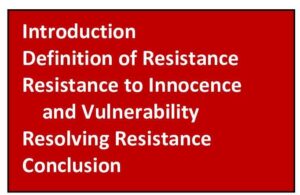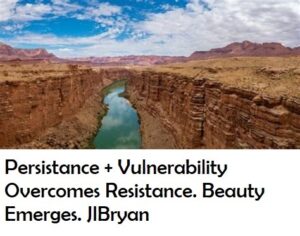Innocence and Vulnerability, Resistance Part (I)
INTRODUCTION
In this Letter we discuss some of the resistances to innocence and vulnerability. These resistances stop us from being innocent and vulnerable. And the resistances are inevitable because we are only beginning to learn how to use these aspects of our self. Also if we want to increase our experience of innocence and vulnerability we will encounter the natural resistance that accompanies the process of change. Even though it is the change of self-improvement we will face the resistance that says, “No stay the same this change is too dangerous.” We also explore ways to overcome resistance. Because innocence and vulnerability are so important we will also devote the May Letter to discovering and resolving the resistance to these crucial aspects of living.
DEFINITION OF RESISTANCE
Resistance is a natural and useful phenomenon that is a part of life. Resistance is what slows and stops things that are moving or keeps things from moving when they are still. Before considering resistance in the psychological realm, let’s consider physical resistance to help us get a feel for this phenomenon.
Consider resistance in the form of friction for example. As we walk our shoes experience friction with the sidewalk. The friction makes it possible for us to walk, to move forward. We can contrast this to walking on ice which has very little friction/resistance and is much more difficult to walk on. Resistance can also bring things to life that are useful, like the filament of an electric light bulb. Electricity passes through the filament encountering resistance and thereby producing heat and light. Resistance in the physical realm is essential. However, in the psychological realm resistance can keep us stuck when we want to move forward.
In the psychological realm resistance is the factor that keeps us the same, which is of value since we need some degree of stability and consistency. However resistance is also “the reason why I can’t” and can keep us frozen in place. Resistance can result in pulling away from the thing that we are resistant to. Resistance results in the avoidance of an approach/avoidance conflict, wanting and not wanting something at the same time. The resulting feelings of an approach/avoidance conflict are ambivalence, the mixed feelings of fear and desire simultaneously, and frustration. Anxiety and depression can develop if this inner conflict is too intense and is chronic and unresolved.
stability and consistency. However resistance is also “the reason why I can’t” and can keep us frozen in place. Resistance can result in pulling away from the thing that we are resistant to. Resistance results in the avoidance of an approach/avoidance conflict, wanting and not wanting something at the same time. The resulting feelings of an approach/avoidance conflict are ambivalence, the mixed feelings of fear and desire simultaneously, and frustration. Anxiety and depression can develop if this inner conflict is too intense and is chronic and unresolved.
RESISTANCE AND OVERCOMING RESISTANCE TO INNOCENCE AND VULNERABILITY
We want and avoid innocence and vulnerability at the same time. Wanting and not wanting innocence and vulnerability at the same time is an approach/avoidance inner conflict that causes us pain. The resistances to innocence and vulnerability keep us from developing them although we want them because we want the benefits. Let’s begin our exploration of the resistances (“the reasons why I can’t”) to innocence and vulnerability and ways to resolve them.
Fear
The first resistance is the feeling of fear, of being afraid. Fear causes resistance as we resist/avoid the thing we are afraid of. Fear is a major cause of resistance in general. Fear is a response to a perceived danger that we think will hurt us. Sometimes our perceptions are accurate assessments of our reality. But sometimes these fears are caused by our beliefs and thinking with little correspondence to reality. One kind of fear is created by thinking, “If I do this, that will happen and it will hurt me causing me pain.” This is the fear of the negative consequences of our behavior. As we look at the fears of innocence and vulnerability we can see this kind of fear happening.
- If I am innocent I will look foolish.
- If I am innocent I will be caught off guard because I have missed something dangerous.
- If I am innocent I will make mistakes because it means that I will ignore what I have learned repeating those mistakes.
- If I am innocent people will take advantage of me.
- If I am innocent my spontaneous behavior will be destructive at times and hurt other people.
- If I am innocent my spontaneous behavior will show me my weaknesses and that scares me.
- If I am innocent my spontaneous behavior will cause me to make mistakes that I don’t want.
- If I am innocent I will never accomplish the goals I set for myself.
Conclusion: “If I am innocent bad things will happen, so it is better not to be innocent.”
- If I am vulnerable I will get hurt. I cannot bear feeling hurt.
- If I am vulnerable I will feel the pain that is stored in me. And I will feel new pain that I want to avoid.
- If I am vulnerable I will discover things about myself that I don’t like.
- If I am vulnerable I will choose the wrong people to be vulnerable with and be judged by them. It will be a disaster that will make me miserable.
- If I am vulnerable I will show other people my true self and they will not like me. I will lose important relationships as they will reject me.
- If I am vulnerable my loving and intimate relationships will deepen. This terrifies me because I will become more afraid of losing these relationships and I don’t want to be afraid of loss.
- If I am vulnerable and become attached through love I will feel loss if I lose the one I love. I can’t tolerate loss and the grief that comes with loss.
- If I am innocent and vulnerable I could be betrayed and this would be too painful.
Conclusion: If I am vulnerable bad things will happen, so it is better not to be vulnerable.”
Point of Empowerment: Sometimes our fears are caused by our beliefs and thinking with little correspondence to reality.
Practice: To reduce these resistances let go of old beliefs and attitudes. Develop new beliefs and attitudes, new approaches to situations, and new abilities and skills.
Resolving the Resistance of Fear
Here are steps to resolve the resistances created by these fears.
Decide it is ok to make mistakes and to look foolish. Mistakes are inevitable since we don’t know everything we need to know about living life. See your mistakes as learning opportunities. We often repeat the same mistake until we learn what we need to know. There may be something complicated and profound in the situations that cause our mistakes. These situations are puzzles to unravel. Also, see looking foolish as being courageous and expanding into new areas of your life.
We can approach everything in our life as though it is new to us, but we may not want to exert that level of effort all the time. So we can choose when to be innocent and when not to be. Innocence includes spontaneous behavior, which we may express. Or we may choose deliberate behavior when we have specific goals in mind. In innocence we do not forget what we have learned although we approach our experiences as if they are new. We can still rely on past experiences for guidance.
Innocent does not mean asleep. Alertness is a good thing. With alertness you would not be caught off guard. Learn to be appropriately guarded by sharpening your ability to perceive what is coming your way from outside you and from inside you. Perceptions are sharpened by being in the “now,” by being aware of the perceptions of your five senses and by tuning into your feelings. Eliminate the defense of denial, pretending that something, like perception, does not exist when it does. Use your courage to be open to perception.
We are immensely fearful of hurt and betrayal. Though it is inevitable that we will experience hurt and betrayal sometime during our life, we need to become discerning about who to be vulnerable with and choose wisely. Determine who you can trust with your vulnerability and who you should mistrust and withhold your vulnerability from. This is the way to protect yourself from hurt and betrayal. Tune into how you feel around a person. As you are vulnerable with someone, are you relaxed and comfortable or are you tense and therefore mistrusting him/her. Learn to trust your feelings and the messages (information) they hold for you. Observe a person’s behavior over time to determine if they are to be trusted with your vulnerability. Are they judgmental? You could risk being vulnerable and see how the other person reacts.
If you find yourself extremely sensitive to, and fearful of, hurt and betrayal there is some unresolved, unhealed trauma that continues to be with you. If you experience a frequent or repeating pattern of hurt and betrayal, there is some unresolved pain, trauma, or something from your past that continues to affect you that must be addressed. These are indicators that professional help might be necessary.
Point of Empowerment: We need to become discerning about the people we are vulnerable with and choose wisely. To accomplish this we can use the innate wisdom we have that we are often not aware of.
Learn how to heal hurt and betrayal by feeling the pain and letting it go. Know that hurt is hurt feelings and that feelings come and go. Feelings can be gone quickly if you do not attach too much meaning and significance to them but let them move through you. (An example of a common meaning attached to these painful feelings is, “I am unworthy of rewarding relationships and deserve to be hurt and betrayed.”) Try letting go of hurt feelings and you will see that they dissipate on their own. If an experience of hurt and betrayal seems to have left an emotional wound, recognize this and work to heal that wound. This may involve getting help.
Increased vulnerability will bring deeper, richer relationships into your life. Know that you will lose some of these relationships and the people that you love. Learn to go through loss and grief as part of living. Grieving a loss is a natural process that completes itself if we do not interfere with it. However, there is no schedule or timetable for the process. Allow yourself to move through grieving and avoid getting stuck along the way. Recognize that you have already experienced loss and grief in your life and that you got through those experiences. Have confidence that you can cope with this pain.
Know that you are probably strong enough to withstand the adversity that may arise as you practice innocence and vulnerability. Develop more strength if necessary to cope with the ups and downs of innocence and vulnerability. If you discover parts of yourself that you do not like or fear, know that everyone makes these discoveries. These are opportunities to learn about yourself and to grow. You may discover anger, destructiveness, and destructive impulses. You become aware of your faults and weaknesses. Develop the self-acceptance that says, “I am a work in progress with positive and negative aspects to my personality and I am ok exactly as I am.” With self-acceptance you can be comfortable with the aspects of yourself that you may not like, the aspects that emerge with your vulnerability with yourself. If you uncover buried and forgotten pain seek to heal that pain with self-exploration done with empathy and compassion for yourself.
vulnerability. Develop more strength if necessary to cope with the ups and downs of innocence and vulnerability. If you discover parts of yourself that you do not like or fear, know that everyone makes these discoveries. These are opportunities to learn about yourself and to grow. You may discover anger, destructiveness, and destructive impulses. You become aware of your faults and weaknesses. Develop the self-acceptance that says, “I am a work in progress with positive and negative aspects to my personality and I am ok exactly as I am.” With self-acceptance you can be comfortable with the aspects of yourself that you may not like, the aspects that emerge with your vulnerability with yourself. If you uncover buried and forgotten pain seek to heal that pain with self-exploration done with empathy and compassion for yourself.
Point Of Empowerment: Learning to use innocence and vulnerability wisely will help you overcome the resistances and empower you to use innocence and vulnerability to enrich your life.
CONCLUSION
In this Letter we began our discussion of the resistances to innocence and vulnerability. Our discussion of resolving resistance has led us to a discussion of resolving fear, the first resistance that we explored. We discussed approach/avoidance conflicts and recommended adopting new beliefs, attitudes, and approaches, creating excellent opportunities for personal growth. In our next Letter we will continue our exploration of resistance and will conclude our discussion of innocence and vulnerability.
